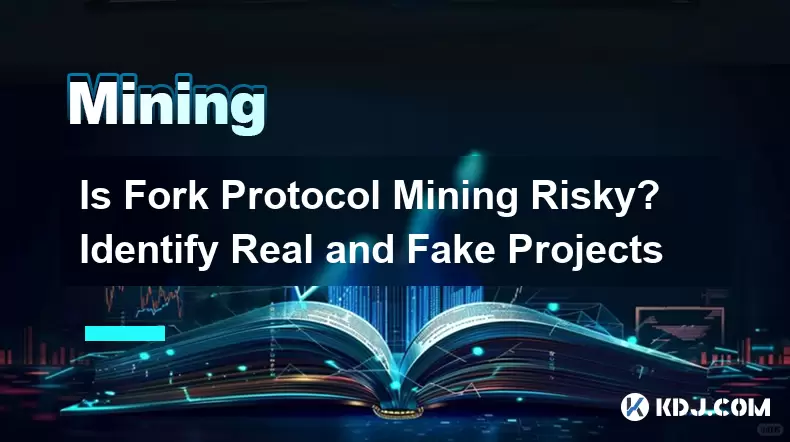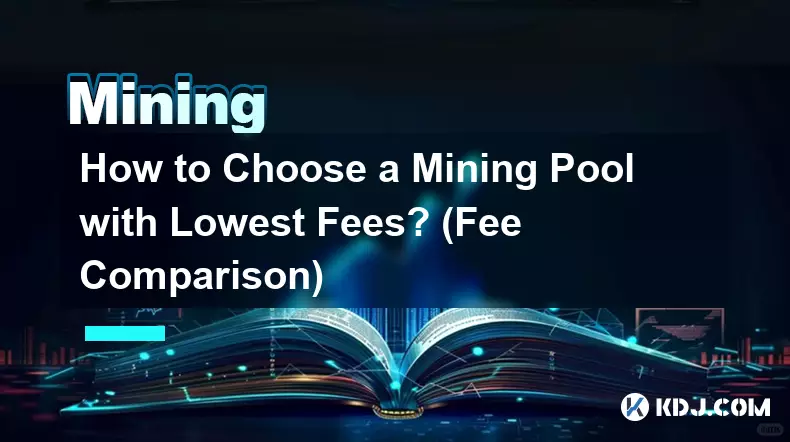-
 bitcoin
bitcoin $87959.907984 USD
1.34% -
 ethereum
ethereum $2920.497338 USD
3.04% -
 tether
tether $0.999775 USD
0.00% -
 xrp
xrp $2.237324 USD
8.12% -
 bnb
bnb $860.243768 USD
0.90% -
 solana
solana $138.089498 USD
5.43% -
 usd-coin
usd-coin $0.999807 USD
0.01% -
 tron
tron $0.272801 USD
-1.53% -
 dogecoin
dogecoin $0.150904 USD
2.96% -
 cardano
cardano $0.421635 USD
1.97% -
 hyperliquid
hyperliquid $32.152445 USD
2.23% -
 bitcoin-cash
bitcoin-cash $533.301069 USD
-1.94% -
 chainlink
chainlink $12.953417 USD
2.68% -
 unus-sed-leo
unus-sed-leo $9.535951 USD
0.73% -
 zcash
zcash $521.483386 USD
-2.87%
Is Fork Protocol Mining Risky? Identify Real and Fake Projects
Fork protocol mining involves staking or providing liquidity on newly forked blockchains, offering rewards but carrying high risks like rug pulls, scams, and smart contract vulnerabilities.
Jul 05, 2025 at 07:33 pm

Understanding Fork Protocol Mining
Fork protocol mining refers to the process where users participate in decentralized finance (DeFi) protocols by staking or providing liquidity to newly forked blockchain networks, often derived from established projects like Bitcoin, Ethereum, or other major cryptocurrencies. These forks can be either soft or hard and usually aim to replicate the original blockchain's data while introducing changes in consensus rules or tokenomics.
When a new fork emerges, miners or liquidity providers are incentivized with newly minted tokens as rewards for securing the network or contributing capital. However, due to the speculative nature of these forks, especially those launched without transparent development teams or real-world use cases, there is a high degree of risk involved in participating.
Why Fork Mining Can Be Risky
One of the primary concerns in fork protocol mining is the potential for rug pulls or exit scams. Many fake projects emerge under the guise of legitimate forks, promising high returns but disappearing shortly after launch. Investors who jump into these opportunities without due diligence may end up losing their funds permanently.
Another risk factor is smart contract vulnerabilities. Since many fork protocols are hastily deployed without thorough audits, they might contain exploitable bugs that hackers can target. Once exploited, users' deposited assets can be drained irreversibly.
Moreover, regulatory uncertainty adds another layer of complexity. Some jurisdictions view fork-based tokens as unregistered securities, which could lead to legal repercussions for early adopters or miners. The lack of clear guidelines around these activities makes fork protocol mining a legally ambiguous territory.
How to Identify Real vs Fake Fork Projects
To avoid falling victim to fraudulent schemes, it’s essential to distinguish between genuine and fake fork protocol mining initiatives. Start by examining the project's whitepaper and roadmap. Legitimate projects usually have detailed documentation outlining their goals, technical specifications, and long-term plans.
Next, look at the development team behind the fork. Genuine projects often feature identifiable developers with verifiable backgrounds in blockchain technology. In contrast, fake projects tend to obscure team identities or use stock images for their profiles.
Community engagement is also a strong indicator. A healthy and active community on platforms like Telegram, Discord, or Reddit suggests that the project has organic support and ongoing development. Conversely, silent or overly promotional channels may signal a scam.
Additionally, check whether the project has undergone third-party smart contract audits. Reputable auditing firms like CertiK, PeckShield, or Hacken provide transparency and security assurance, reducing the chances of hidden malicious code within the protocol.
Steps to Safely Participate in Fork Protocol Mining
- Ensure you understand the underlying blockchain and how the fork operates. Research its consensus mechanism, block time, and reward structure.
- Verify the legitimacy of the project through official communication channels and cross-reference information across multiple sources.
- Use a trusted wallet like MetaMask or Trust Wallet to interact with the protocol. Avoid connecting wallets that contain large sums of funds unless absolutely necessary.
- Review the smart contracts using tools like BscScan or Etherscan. Look for verified contracts and analyze transaction history for unusual patterns.
- Only invest what you're willing to lose. Given the high-risk nature of fork protocol mining, diversifying your exposure and limiting capital allocation is crucial.
By following these steps meticulously, participants can significantly reduce their exposure to fraud and maximize their chances of engaging with authentic fork protocol mining opportunities.
Common Scams in Fork Protocol Mining
Scammers often exploit the hype surrounding new forks by launching phishing websites or impersonating project founders on social media. One common tactic involves fake airdrops that require users to connect their wallets or send small amounts of crypto to claim free tokens—only for the scammers to drain the wallet afterward.
Another prevalent scheme involves pump-and-dump groups promoting low-cap fork tokens on messaging apps. Once enough buyers accumulate the token, the organizers sell off their holdings, causing the price to crash and leaving retail investors with worthless assets.
Some fake forks even mimic popular DeFi protocols, offering higher yields to lure users into depositing funds. These clones may appear visually identical to the original platform but operate on fraudulent smart contracts designed to steal user deposits.
Remaining vigilant and skeptical of unusually high yield promises is key when navigating the world of fork protocol mining.
Frequently Asked Questions (FAQs)
What should I do if I suspect a fork protocol is fake?If you believe a fork protocol mining initiative is fraudulent, immediately stop any interaction with the platform. Report the suspicious activity to relevant forums, blockchain explorers, or cybersecurity organizations. Never share private keys or seed phrases under any circumstances.
Are all fork-based tokens scams?No, not all fork protocol mining tokens are scams. Some legitimate forks have gained traction and built sustainable ecosystems. However, the majority lack transparency, utility, or long-term viability, making them high-risk investments.
Can I recover funds lost in a fork protocol scam?Recovering funds from a scammed fork protocol mining platform is extremely difficult, if not impossible. Blockchain transactions are irreversible, and most scammers operate anonymously. Legal action may be an option in some jurisdictions, but success varies widely.
How do I verify the authenticity of a fork's smart contract?Use blockchain explorers like BscScan or Etherscan to review the contract address. Check if the contract is verified and read through the code for any suspicious functions. Additionally, see if the contract has been audited by reputable firms or reviewed by the community.
Disclaimer:info@kdj.com
The information provided is not trading advice. kdj.com does not assume any responsibility for any investments made based on the information provided in this article. Cryptocurrencies are highly volatile and it is highly recommended that you invest with caution after thorough research!
If you believe that the content used on this website infringes your copyright, please contact us immediately (info@kdj.com) and we will delete it promptly.
- Ilocos Norte's Vibrant Festival Immortalized on New P100 Coin by BSP
- 2026-02-02 21:55:01
- The Warsh Effect: Bitcoin Takes a Dive as Fed Nominee Sparks Crypto Wipeout
- 2026-02-02 22:05:01
- Your Pocket Change Could Be Gold: Spotting the Valuable £2 Coin Error
- 2026-02-02 22:40:02
- ZAMA Token Launches Globally, Ushering in a New Era for Confidential Blockchains
- 2026-02-02 22:40:02
- LBank Elevates DeFi with GOLDEN FI (GLINK) Listing, Bridging Real-World Assets to the Blockchain
- 2026-02-02 21:30:02
- US Investors Pull Billions from Crypto Funds Amidst Shifting Sentiment, CoinShares Report Highlights
- 2026-02-02 22:35:00
Related knowledge

How to Spot a Cloud Mining Scam? (Red Flags to Watch For)
Feb 02,2026 at 08:20am
Unrealistic Return Promises1. Platforms advertising guaranteed daily returns above 1–2% without disclosing underlying hardware, electricity costs, or ...

How to Earn Passive Income with DePIN Mining? (New Trend 2026)
Feb 01,2026 at 12:40pm
Understanding DePIN Mining Mechanics1. DePIN mining relies on real-world infrastructure participation rather than computational hashing. Users deploy ...

How to Mine Vertcoin (VTC) on Your Gaming Desktop? (One-Click Miner)
Feb 02,2026 at 03:39am
Understanding Vertcoin's Mining Algorithm1. Vertcoin uses the Verthash algorithm, which is intentionally memory-hard and designed to resist ASIC domin...

How to Set Up a Quiet Mining Rig at Home? (Noise Reduction)
Feb 01,2026 at 11:00pm
Acoustic Enclosure Design1. Use rigid, dense materials such as MDF or acoustic-grade plywood for the enclosure walls to block mid-to-high frequency no...

How to Choose a Mining Pool with Lowest Fees? (Fee Comparison)
Feb 02,2026 at 02:39am
Understanding Mining Pool Fee Structures1. Pool operators charge fees to cover infrastructure, maintenance, and administrative costs. These fees manif...

How to Mine Bitcoin on Mac (M1/M2/M3)? (Software Tutorial)
Feb 01,2026 at 07:19pm
Understanding Bitcoin Mining on Apple Silicon1. Bitcoin mining relies on solving cryptographic puzzles using computational power, and Apple’s M1, M2, ...

How to Spot a Cloud Mining Scam? (Red Flags to Watch For)
Feb 02,2026 at 08:20am
Unrealistic Return Promises1. Platforms advertising guaranteed daily returns above 1–2% without disclosing underlying hardware, electricity costs, or ...

How to Earn Passive Income with DePIN Mining? (New Trend 2026)
Feb 01,2026 at 12:40pm
Understanding DePIN Mining Mechanics1. DePIN mining relies on real-world infrastructure participation rather than computational hashing. Users deploy ...

How to Mine Vertcoin (VTC) on Your Gaming Desktop? (One-Click Miner)
Feb 02,2026 at 03:39am
Understanding Vertcoin's Mining Algorithm1. Vertcoin uses the Verthash algorithm, which is intentionally memory-hard and designed to resist ASIC domin...

How to Set Up a Quiet Mining Rig at Home? (Noise Reduction)
Feb 01,2026 at 11:00pm
Acoustic Enclosure Design1. Use rigid, dense materials such as MDF or acoustic-grade plywood for the enclosure walls to block mid-to-high frequency no...

How to Choose a Mining Pool with Lowest Fees? (Fee Comparison)
Feb 02,2026 at 02:39am
Understanding Mining Pool Fee Structures1. Pool operators charge fees to cover infrastructure, maintenance, and administrative costs. These fees manif...

How to Mine Bitcoin on Mac (M1/M2/M3)? (Software Tutorial)
Feb 01,2026 at 07:19pm
Understanding Bitcoin Mining on Apple Silicon1. Bitcoin mining relies on solving cryptographic puzzles using computational power, and Apple’s M1, M2, ...
See all articles










































































